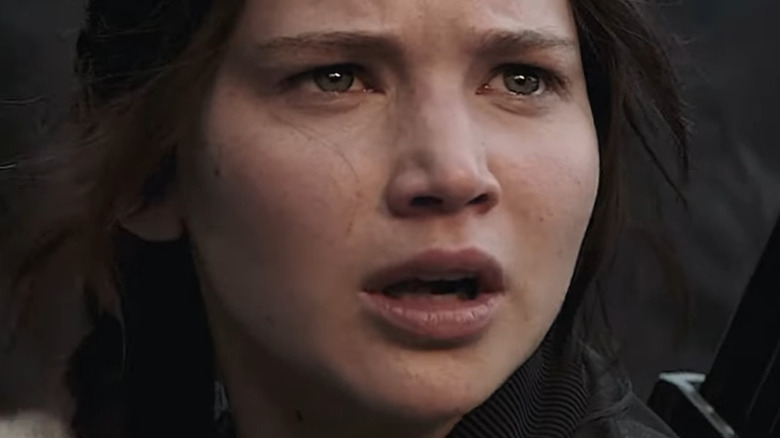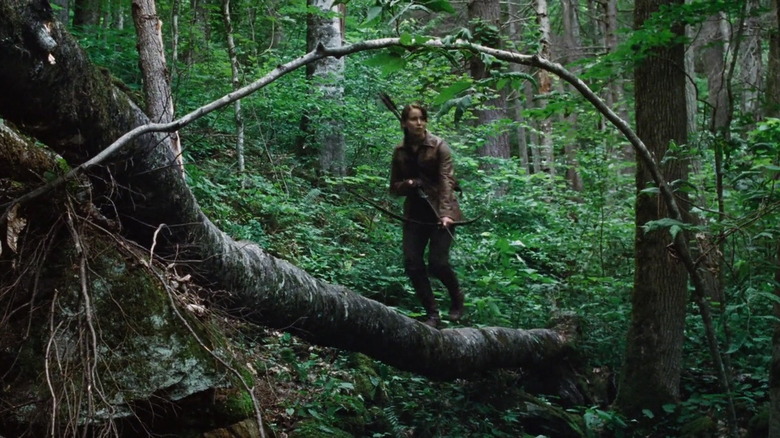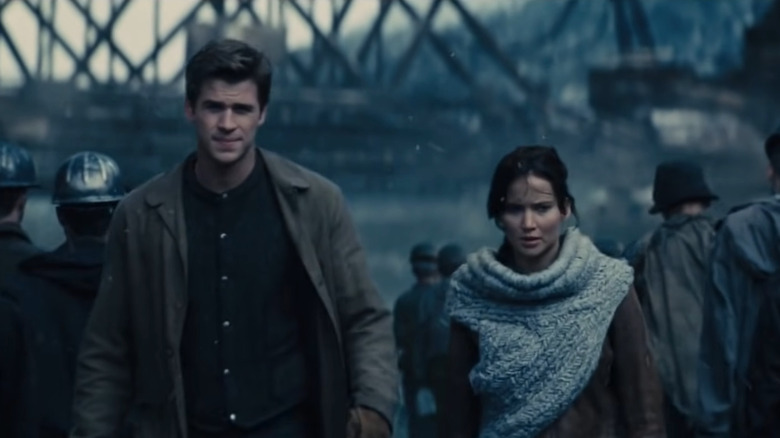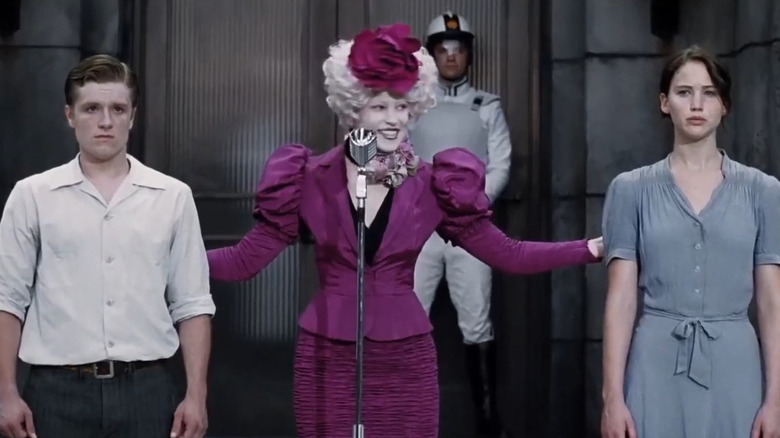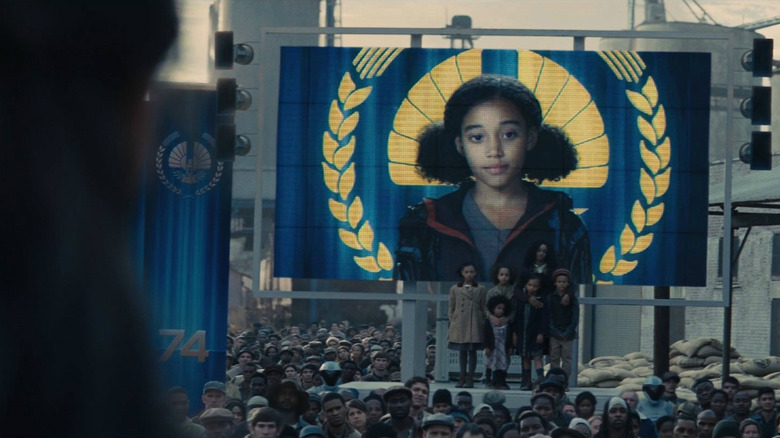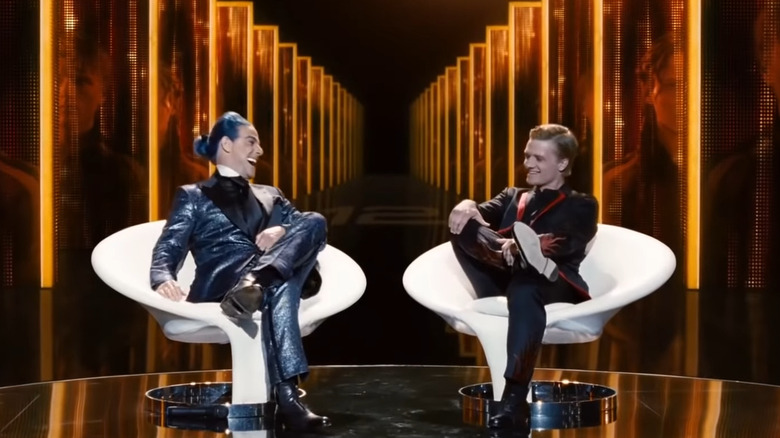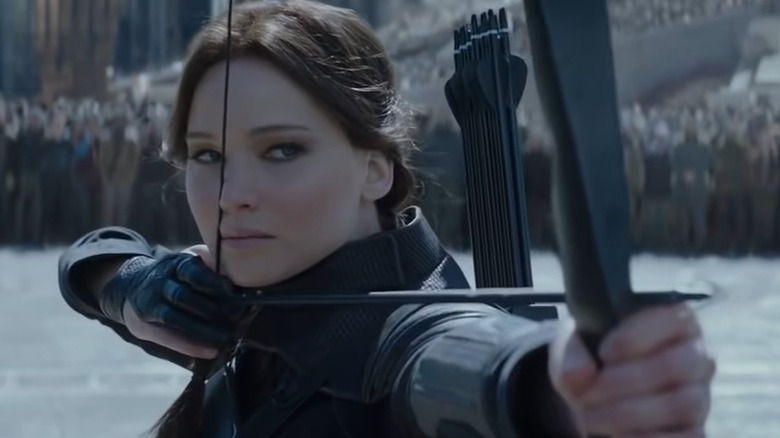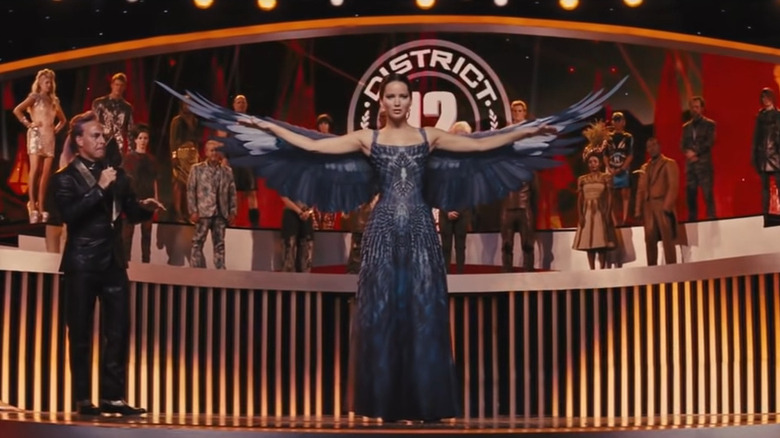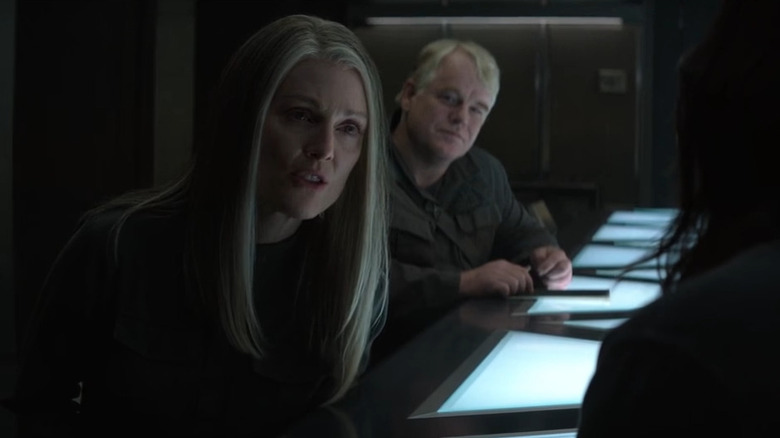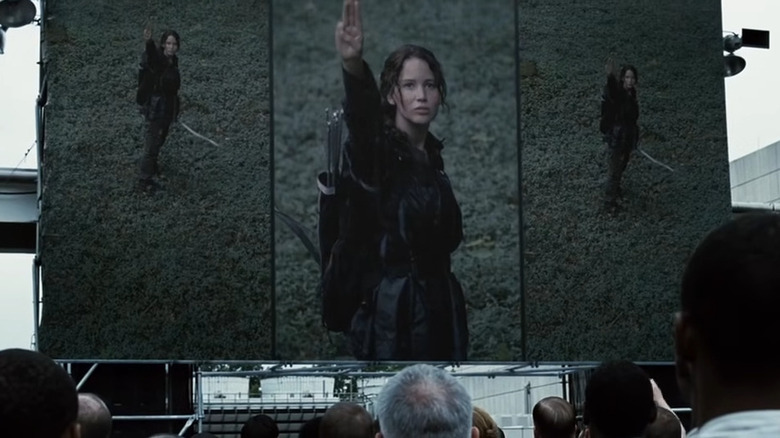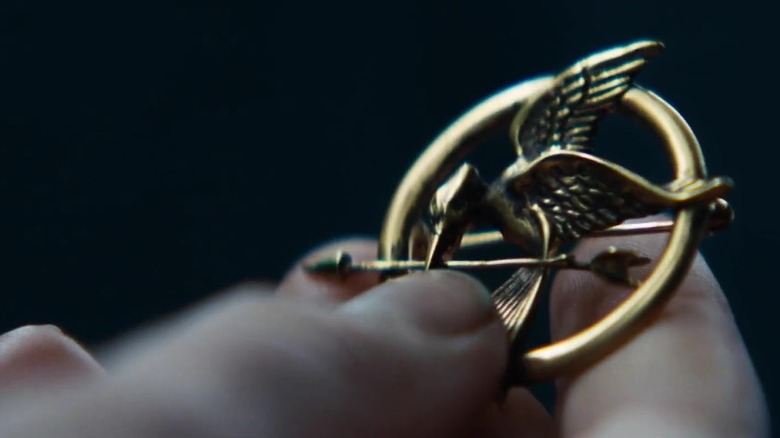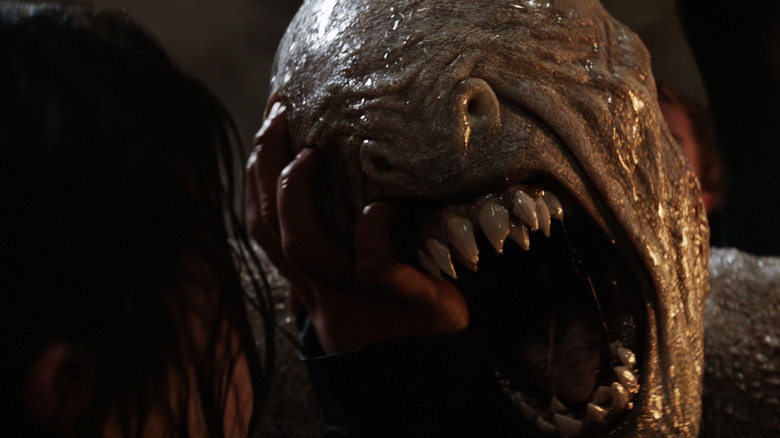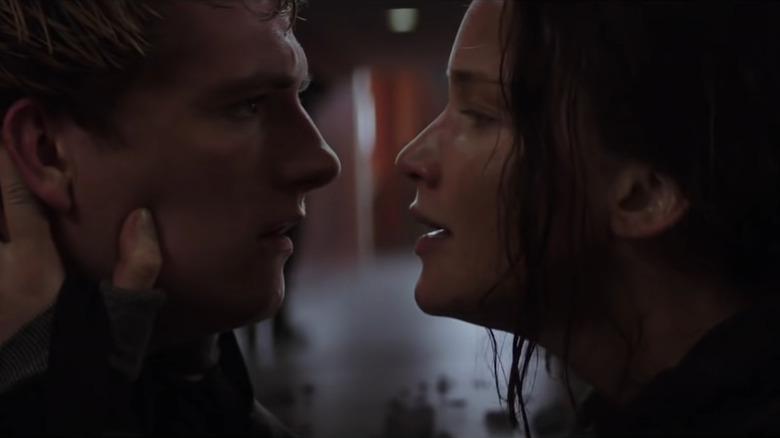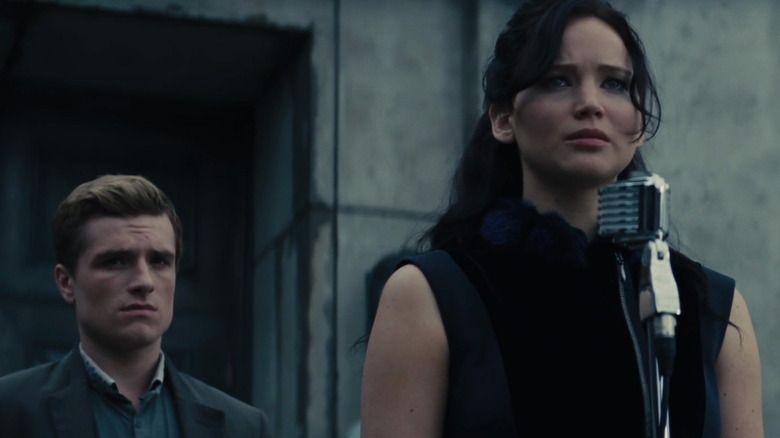Things That Happen In Every Hunger Games Movie
Female-led blockbusters are unfortunately still pretty rare in Hollywood. What's even more rare is to have a female-led action franchise. But "The Hunger Games" films based on the novels by Suzanne Collins ticked all these boxes and were also responsible for putting Jennifer Lawrence on the map as an A-list actress.
Lawrence stars in the series as Katniss Everdeen, a poor girl in the dystopian country of Panem. Katniss is unwillingly dragged into an annual ritual involving children from various districts fighting each other to death for entertainment, but her courage and defiance eventually sparks a revolution. However, even though "The Hunger Games" takes us into a strange new world, the films often feel familiar — largely because certain plot beats and story elements show up in each installment. From wardrobe changes and archery abilities to character choices and terrifying twists, here are the things that happen in every single "Hunger Games" movie.
Katniss shows off her skills
Katniss Everdeen is an effective hero for the brutally violent world of the Hunger Games. That's because she's spent her whole life training her body and mind to become an effective hunter and strategist. And the franchise gives ample evidence of her skills in each installment.
Naturally, the place where Katniss gets to kick the most butt is the Games themselves. Right from the first time she volunteers to become a part of the Hunger Games, Katniss proves she has certain advantages over the other contestants that will ensure her victory in the Games despite the many obstacles in her path. Of particular use are Katniss' expertise with her bow and arrow, her ability to survive in the outdoors, and later on, her surprisingly effective leadership skills.
After the revolution begins to overthrow the corrupt government ruling Panem, Katniss becomes a symbol of resistance, and she's once again called on to take an active role in the rebellion. Katniss makes it her final mission to find and kill President Snow (Donald Sutherland) even if it means losing her life in the process. Despite years of fighting taking its toll on her body and mind, Katniss never gives in but keeps soldiering down her chosen path.
Gale has extreme views
Anyone who knows "The Hunger Games" movies even slightly knows about the love triangle between Katniss, Peeta Mellark (Josh Hutcherson), and Gale Hawthorne (Liam Hemsworth). That captivating romance plays out over the course of four movies, but really, it's clear from the start that Gale isn't an entirely suitable match for Katniss.
Despite looking like the hunky younger brother of a certain God of Thunder, Gale's good looks mask a deeply troubled mind that's been warped by all the cruelty he's witnessed in Panem from a young age. Katniss' friend since childhood, Gale lost his father when he was young, which incited a deep and burning hatred for the ruling Capitol district and all it stands for. Gale also has a deeply held prejudice against those he sees as District 12's "privileged" class, including Peeta.
With each new movie, Gale's views on liberation from the Capitol grow more extreme. He reaches a tipping point after the incident when District 12 is bombed to quell the rebellion, when he becomes willing to kill everyone who belongs to the Capitol, even little children who just happened to be born there. It's Gale who helps create the bombs that kill Prim, and his increasingly violent ways lead to Katniss finally choosing Peeta over him.
Effie tries to keep things light
"The Hunger Games" isn't exactly a light-hearted romp through a Young Adult setting. Considering the basic premise of the series is "children try to kill each other to survive," there's not a lot of room for humor or laughs in the franchise. But the films do occasionally try to inject a lighter note into the proceedings, particularly through Effie Trinket (Elizabeth Banks).
Effie starts out as an escort charged with inducting the tributes from District 12 into their roles in the Hunger Games. Even though she has an antagonistic role as a servant of the Capitol, Effie is a cheerful character who tries to keep everyone's spirits high while carrying out her difficult task of essentially leading innocent children to their slaughter.
Effie's role in the movies was changed from the novels to make her more heroic. By the time of "Mockingjay – Part 1," Effie defects from the Capitol and become one of Katniss' allies in her battle against the Panem government. Although not the brightest character in the series, Effie's cheerful demeanor, passion for frivolous things, and jokey nature provide a welcome break from the general bleakness of the franchise.
Taking stock of major deaths
The basic theme of "The Hunger Games" is how, with enough propaganda from the ruling class, even death and desperation can be turned into an opiate for the masses to distract them from their true problems. The Games function as high-end spectacle for the various districts of Panem to brainwash the common folk into accepting their subjugation.
As such, the participants in the Games are not seen as victims but hallowed "tributes" who can bring glory to their district by lasting longer than the other participants. In each movie some time is devoted to taking stock of the major characters who have died in the Hunger Games or in relation to the rebellion brewing among the districts that wants to overthrow the ruling class of the Capitol once and for all.
While the constant reminders of the dead can be harrowing for fans, they are also an important reminder of the very high, literally life-and-death stakes that the main cast is constantly dealing with. It also makes for a better understanding of the grim reality of the true power of the Capitol and the diminishing chances of victory of the rebellion when so many of its soldiers are killed off one by one.
Caesar Flickerman hypes the violence
If Effie Trinket is the dim but well-meaning Hunger Games chaperone who tries to put a happy face on the entire ordeal, Caesar Flickerman (Stanley Tucci) performs a similar function for the larger audience of Panem tuning in to watch the Games in all their glory. Flickerman is the genial host of the televised event of the Hunger Games.
As such, the main part of Flickerman's job is to put a positive spin on things, no matter how terrible the events. And boy, does Flickerman try hard to make the Games look like an exciting and glamorous show rather than the reality of it being state-sanctioned murder for entertainment purposes. In effect, Flickerman is one of the most effective tools of propaganda at the Capitol's disposal.
As the ruling government slowly loses its grip on Panem with each new movie in the franchise, Flickerman's role also starts to diminish. But he still pops up from time to time, his ever-present smile starting to slip more often as he becomes increasingly more disillusioned with the violence surrounding him and struggles greatly to continue to spew propaganda on behalf of the Capitol.
Katniss rebels against the plan
While Katniss is the main hero of "The Hunger Games," perhaps it would be more fitting to call her an antihero based on her behavior. Katniss has always been the reluctant savior, who only joined the Games to protect her little sister, and she finally becomes the even more reluctant face of the rebellion against the Capitol district.
Since Katniss spends her entire life being a loner, it is particularly difficult for her to act as part of a team or follow the orders of the establishment. In the first movie, it's made clear that Katniss provides food for her family by going into restricted forest areas to hunt animals. After joining the Hunger Games, Katniss continues to play by her own rules, and her daring eventually forces the Capitol to appoint both her and Peeta as joint winners.
But Katniss' tendency to not follow the plan starts getting her in trouble once she becomes part of the rebellion against the Capitol. This also becomes a problem when Katniss is asked to act in a certain manner in front of the public, which she struggles to do because her heart instinctively rebels against the subterfuge. Perhaps her greatest act of rebellion comes in the final film, where instead of executing the deposed Snow, she assassinates the newly installed Alma Coin (Julianne Moore).
Katniss gets a new costume
"The Hunger Games" play out like a bleak parody of reality television. You have a death battle between children being packaged into a glamorous event for the entertainment of the masses, complete with winners of the Games being turned into celebrities and made to seem like victors instead of shell-shocked child soldiers.
As a participant and eventual winner of the Hunger Games, Katniss often finds herself being paraded in front of adoring crowds in flashy regalia. A big part of the presentation is outfitting Katniss in fancy new threads, the more outlandish the better. These clothes are a far cry from the plain frocks or hunting apparel Katniss used to wear in her previous life as a District 12 resident.
Each movie in the franchise showcases a dramatically different new dress for Katniss, and they all make a statement about the present state of Katniss' life. There is the "girl on fire" dress that literally has Katniss and Peeta's clothes on fire. Of course, there's the iconic wedding dress that turns into the Mockingjay outfit in front of a spellbound audience. And after becoming the face of the rebellion, Katniss trades in her flashy but completely impractical clothes for a warrior archer's gear to symbolize her new, somber responsibilities and powerful position in Panem.
Our hero doubts her allies
Since the nation of Panem operates on a basis of propaganda and subjugation, it's not a place that generates a lot of trust among its residents. Growing up in the particularly derelict District 12, Katniss has never had the luxury of being able to trust anyone outside her immediate circle of friends and family, even if they're genuinely looking out for her.
Due to this, she's developed a deeply distrustful nature that continues to be a major part of her personality across each movie. In the first Hunger Games, Katniss struggles to trust anyone outside of Peeta, although this turns out to be the best strategy for winning the game. Katniss also finds an unlikely mentor in previous Hunger Games winner Haymitch (Woody Harrelson), but her confidence in Haymitch is shaken after she realizes he has his own secret agenda in play.
Things get even worse for Katniss after she joins the rebellion against the Capitol, where so many acts of violence are carried out behind her back by her so-called allies that leave her feeling bitter and resentful. Katniss' natural distrust of people is also one of the reasons why she has such a hard time reciprocating Peeta's love because, in her experience, it's unheard of for someone to show her genuine love and affection without an ulterior motive.
Katniss wins people over
Growing up lonely and poor in District 12, Katniss never had the opportunity to develop her social skills. It's a deficiency that she's fully aware of, and Katniss often automatically assumes people don't like her because of her off-putting personality. This also means she tends to push people away before they can do the same to her.
But despite considering herself unlikable, Katniss actually has a natural charisma and innate decency that brings people over to her side very effectively. We see this play out with Peeta, Rue (Amandla Stenberg), Haymitch, and even Effie Trinket in the first movie. By the events of the second film, Katniss becomes a beloved celebrity all over Panem and is greeted by adoring crowds wherever she goes.
It's this same popularity that makes Katniss the face of the uprising against the Capitol. Most of the other soldiers in the rebellion are in awe of Katniss based on her reputation alone, and her unyielding nature when it comes to sticking to her principles makes her into a larger-than-life symbol against tyranny and oppression that the citizens of Panem can rally around.
References to the Mockingjay and the salute
A large part of Katniss' identity that gets developed over the course of the franchise is her role as the "Mockingjay." For a very long time, the people of Panem lived in total subjugation under the power of the Capitol. No one ever dared to go against the government and its bloodthirsty rules no matter what the provocation. But Katniss upends the view of the Capitol as an all-powerful entity by not only winning her first Hunger Games event but also tricking the Capitol into letting both her and Peeta become joint victors.
This openly defiant move transforms Katniss into the symbolic role of the "Mockingjay," who could go against the power of the Capitol and inspire others to start their own rebellion. The name was taken from a gold pin resembling a Mockingjay that Katniss wears since the first movie.
Another prominent symbol throughout the series is the "three-fingered salute." This is the sign that's used in District 12 as a gesture of respect, love, or thanks. The salute is used most prominently by Katniss to honor Rue's passing. After the moment gets caught on camera, the salute is adopted by other people in Panem and follows Katniss where ever she goes for the rest of the series.
Heroes are chased by mutts
Every dystopian future society requires a bunch of strange, mutated creatures to scare the main heroes with. In the world of "The Hunger Games," that role is fulfilled by "muttations," which are genetically enhanced creatures that resemble various animals — creatures specifically designed by the creators of the Games to attack the tributes and keep them in line.
Katniss and the other characters who must participate in the Games often encounter the mutts, whether they're aware of it or not. For instance, the jabberjay is a kind of muttation that looks like an ordinary bird which can be used to spy on the tributes. Tracker jackers take the form of giant wasps that can kill their victim after driving them to madness.
There are also wolf, lizard, monkey, and snake mutts that have popped up in the franchise at various points. While they are dangerous enough on their own, what makes the mutts even more disturbing is it's strongly hinted that at least some of them — particularly the lizard and wolf mutts — were once humans who were captured by the Capitol and experimented upon.
Katniss saves Peeta
"The Hunger Games" is a franchise with a female action lead. That means Katniss gets to do a lot of the things routinely associated with a male hero. One of those things is saving the "damsel in distress" who will eventually turn into the love interest. In "The Hunger Games," the role of that damsel is often fulfilled by Peeta Mellark.
It's not that Peeta is entirely helpless on his own. It's just that part of his initial strategy for surviving the Games is to paint himself to look like a rock. After this uninspiring start, a major part of Katniss' motivations becomes to look out for Peeta and save him from one dangerous situation after another.
In the first movie, Katniss keeps Peeta safe during the Hunger Games after he injures his leg. After that, the two become genuine friends with a "will they/won't they" dynamic. But the Capitol tries to use that relationship by brainwashing Peeta into working for them, and once again, it's up to Katniss to save him. Despite being the male lead, Peeta's job is not to save the day but enable Katniss' journey with his steadfast love and affection ... and occasional bouts of abject helplessness.
The big monologue
"The Hunger Games" deals with many major themes throughout its run. You have the notion of a corrupt government keeping the masses under control through brainwashing and the threat of violence. You have reality television masking the true nature of the misery being inflicted on its participants for the sake of entertainment. At the personal level, you have Katniss' struggles to put her trust in others and believe in her own self after a lifetime of poverty and desperation.
Sometimes such themes are reflected in the actions of the characters. Other times, a certain character will stop in the middle of the action to deliver a pointed monologue instead. This is in keeping with the novels the films are based on, which feature heavy commentary from Katniss and other characters about the world they live in.
There's the time President Snow explains the idea behind holding the Hunger Games. "A little hope is effective," he states as to why there needs to be a single winner of the Games instead of killing all the tributes outright, also cautioning that "a lot of hope is dangerous." There is Katniss' speech to District 11 in tribute to their fallen champion in "Catching Fire" that rallies the masses over to her side. And then there is the bitter but ominous speech that Katniss delivers in "The Hunger Games: Mockingjay – Part 1," which concludes with the iconic line, "If we burn, you burn with us."
